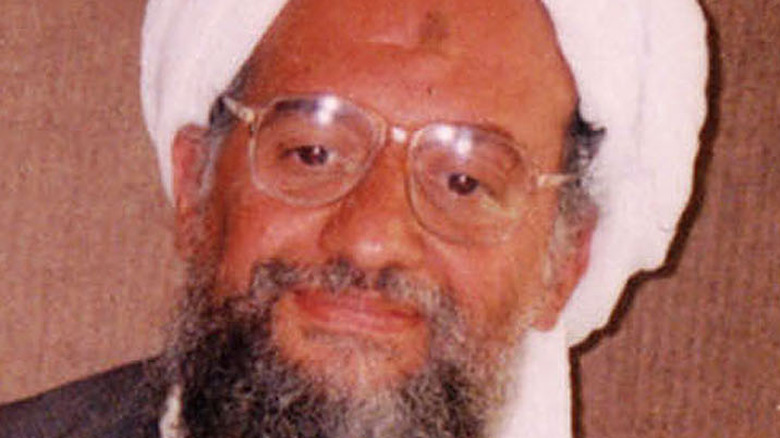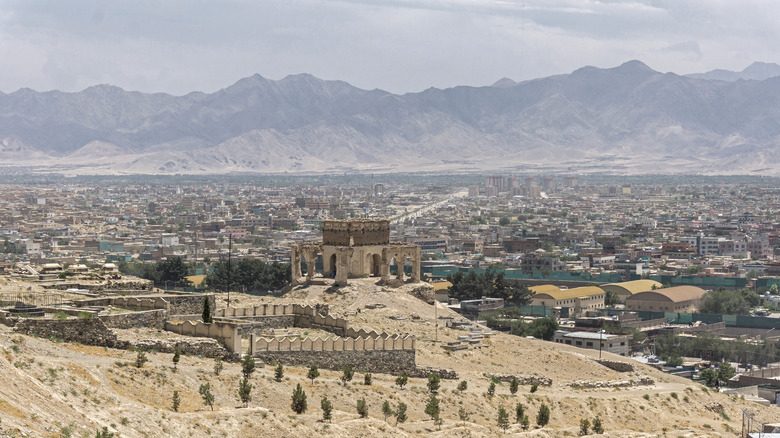Who Experts Think Could Become The New Leader Of Al-Qaeda
On July 31, the U.S. government, under the direction of President Joe Biden, carried out a missile strike in Afghanistan which killed the leader of al-Qaeda, Ayman al-Zawahiri (via BBC). The strike was targeted to hit Zawahiri (above) when he was on his balcony at his home in downtown Kabul, according to CNN. It was carried out by precision-guided Hellfire missiles, which are directed and dropped by drones. Though drone strikes have previously resulted in civilian casualties, this particular hit was carried out without collateral damage: Zawahiri's wife and daughter, who were just inside the home when Zawahiri was killed, weren't injured by the strike, the BBC says.
After Zawahiri's death, movements in downtown Kabul were restricted by the Taliban amid speculation within al-Qaeda that they were partially at fault for Zawahiri's death, according to CNN. In the meantime, people have begun to wonder who Zawahiri's successor will be, and how that individual might guide the future of al-Qaeda.
Who was the first leader of al-Qaeda?
Ayman al-Zawahiri is the second leader of al-Qaeda, according to the International Center for Counter-Terrorism. The first leader was Osama bin Laden, who was killed in a U.S. raid in 2011 (via Britannica). Bin Laden, the founder of al-Qaeda, led the organization throughout its expansion and is responsible for multiple terrorist attacks committed by the group — mostly famously, the 9/11 terrorist attacks on the World Trade Center.
Historically, al-Qaeda has had support from the Taliban, according to Britannica, which mostly recently took over Afghanistan in mid-2021 following U.S. withdrawal from the country (via the Council on Foreign Relations). Though the U.S. was aware of Bin Laden's involvement in the 9/11 attacks as early as 2004, according to Britannica, he escaped capture for years, during which period he was one of the most wanted men on Earth. It wasn't until 2011 that U.S. officials were able to find Bin Laden living in Pakistan and carry out a strike against him.
Who was Ayman al-Zawahiri?
Ayman al-Zawahiri took control of al-Qaeda in 2011, after having been chosen by bin Laden as his successor (via CNN). Zawahiri became a jihadist as a teenager, according to CBS News. When he was 30 years old, he participated in the assassination of Egyptian President Anwar Sadat. Later, Zawahiri would go on to be involved in many other counter-government attacks, including terrorist attacks against the United States, such as bombings of U.S. embassies and 9/11, according to CNN. Some people go so far as to call Zawahiri the "true architect" behind the attacks (via CBS News).
In the 1990s, Zawahiri became closely tied to Bin Laden, then the leader of al-Qaeda, and in 1998 signed an agreement with bin Laden that to "kill and fight Americans and their allies, whether civilians or military, is an obligation for every Muslim," according to CNN. That agreement fundamentally tied Zawahiri's Egyptian jihadist group to al-Qaeda, and Zawahiri soon became bin Laden's second-in-command.
After taking control of al Qaeda himself, Zawahiri was often criticized for being ineffectual, according to the International Center for Counter-Terrorism, and al-Qaeda lost some of its influence and reach under his leadership, according to CBS. But other experts have called him a relatively steady hand.
Zawahiri's most likely successor
With Zawahiri gone, many people have started to look for who will fill the power vacuum at the top of one of the world's most notorious terrorist organizations. So who is most likely to be chosen?
One of the top names to come out of speculation is Saif al-Adel, according to CNN. Very little is known about al-Adel, but he's one of the older people on the shortlist, being more of a contemporary to bin Laden and Zawahiri than a successor. Moreover, he's known for his military prowess.
However, al-Adel, who was previously a trainer in al-Qaeda, according to Reuters, has some marks against him that might make it harder for him to be selected. For one, al-Adel is under semi-house arrest in Iran, according to NPR, and might have difficulties getting into Afghanistan, the International Center for Counter-Terrorism notes. Since the future al-Qaeda leader will need to continue to direct their operations out of the Taliban stronghold, this could be a problem. Moreover, because of his age, al-Adel is experienced, but he won't necessarily be well-liked by younger operatives.
Zawahiri's son-in-law is also up for the position
A slightly more youthful candidate is Abdal-Rahman al-Maghrebi, who is the son-in-law of Zawahiri, according to CNN. Maghrebi, who is Moroccan, was a software programming student in Germany before he became the manager of al-Qaeda's media wing, according to Reuters. That same publication describes Maghrebi as a "rising star" in al-Qaeda.
That view of Maghrebi is reportedly shared by those inside al-Qaeda, with one member saying of Maghrebi that he "has high morals, he can keep a secret, and he is patient. His ideology is prudent, and he has excellent awareness," according to CNN. This positive view of Maghrebi could help boost him up as a potential option. His close familial relationship with Zawahiri will also likely work in his favor, according to the International Center for Counter-Terrorism.
Maghrebi and al-Adel aren't the only possible choices. There are a few more names floating around as options.
Other possible candidates
Other senior leaders identified by analysts as potential future emirs include Yazid Mebrak and Ahmed Diriye, both of whom lead auxiliary wings of al-Qaeda based in African countries, according to CNN. Researchers also identified other al-Qaeda members, including Abu Ikhlas al-Masir, who currently leads al-Qaeda in Syria, and Amin Muhammad Ul Haq Saam Khan, who did security for bin Laden, as possibilities, according to the International Center for Counter-Terrorism.
Whoever is eventually chosen for the role, their leadership will be a key turning point for the organization, the International Center for Counter-Terrorism says. The transition period between leaders is a fragile time in which a group can grow stronger, become weaker, or even dissolve entirely. A new leader could choose to try to keep most structures of the organization in place or make significant changes. Ultimately, what happens to al-Qaeda will depend on who is picked and what leadership strategies they decide to employ to guide the terrorist organization moving forward.





